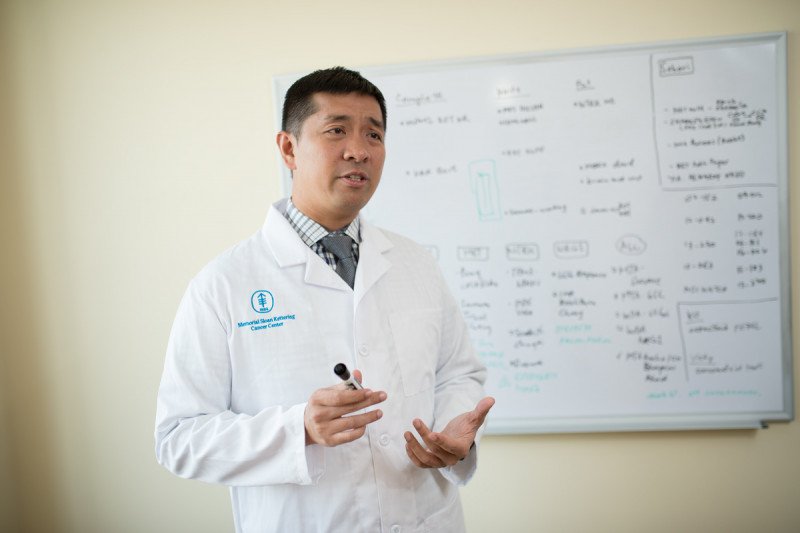
At last year’s annual meeting of the American Association for Cancer Research (AACR), Memorial Sloan Kettering medical oncologist Alexander Drilon presented combined results from two phase I trials analyzing a novel drug called entrectinib for the treatment of people with solid tumors. Part of each trial was designed similar to a basket trial, meaning that the researchers tested entrectinib in patients based on genetic changes in their cancer, regardless of the physical location of the tumor.
The results were positive: Entrectinib was found to be safe and well tolerated in more than 120 people with solid tumors, and the drug elicited a response in 25 patients.
Now entrectinib is poised to begin phase II trials, which will provide a much clearer picture of how effective this drug will be — and if so, which cancers may respond well to the treatment.
We spoke with Dr. Drilon during his poster presentation at the 2017 AACR Annual Meeting to learn more about entrectinib and to get an update on the drug’s development.
Phase I: How We Arrived Here
Entrectinib targets a change in a gene called a gene fusion, which results when two different genes join together. The five gene fusions targeted by entrectinib are NTRK (which comprises NTRK1, 2, and 3), ROS1, and ALK.
Based on the drug’s mechanism of action (the way the drug works biochemically), the side effects from entrectinib were not unusual, Dr. Drilon says. The most common included fatigue, distortion of taste, and nausea, and none of them caused patients to discontinue the trial.
Though the primary goal of the phase I trial was to show whether entrectinib is safe and determine the dose at which it should be given, Dr. Drilon says he did observe rapid (within one month of treatment) and durable (lasting more than two years) responses across five cancers: non-small cell lung cancer, metastatic colorectal cancer, mammary analogue secretory carcinoma (a rare cancer of the salivary gland), renal cell carcinoma, and melanoma.
Dr. Drilon highlights the fact that entrectinib is designed to penetrate the blood-brain barrier and has demonstrated activity against cancers that started in the central nervous system (CNS) as well as those that spread there.
“This drug was designed to cover the brain well,” Dr. Drilon says. “Many drugs can’t penetrate the CNS compartment efficiently, but this drug can.”
Phase II: The Next Step
From the safety analysis, researchers found a dose of the drug that they will test in a more-limited version of a phase II basket trial. Each “mini basket” will include people whose cancers have one of the five gene fusions and will enroll up to 62 patients. Researchers will recruit patients from 15 countries worldwide and from more than 120 institutions.
At MSK, patients who are a good match for the trial will be identified using MSK-IMPACT, a powerful genome-sequencing tool that allows physicians to find mutations in tumors. Patients being treated at other institutions will have the option to send a tumor sample to Ignyta, the pharmaceutical company developing the drug. If the tumor tests positive for one of the gene fusions, that patient can still receive normal chemotherapy until he or she needs a new line of therapy (which, in this case, would be entrectinib).
“Testing for one of these gene fusions in advance will allow doctors to determine which patients would be candidates for this trial,” Dr. Drilon says. “This way, even though patients may be receiving other treatments at the time of testing, the physician can keep this trial in his or her back pocket as the possible next line of therapy. Making the decision to test early is important.”
Looking Ahead
Entrectinib is not the only game in town targeting these gene fusions, however. Larotrectinib (being developed by Loxo Oncology) is a drug that works similarly to entrectinib and is also progressing through clinical trials.
“This is partly a race to the finish to get these drugs approved to help more patients, and these are two major drugs that are currently in testing,” Dr. Drilon says, though it’s possible both drugs could be approved around the same time. “The data look good for both.”
Also at the 2017 AACR meeting, Alison Schram, a graduate research assistant in Ross Levine’s lab at MSK, reported on the case of a 35-year-old woman with recurrent glioblastoma that had a mixed response to larotrectinib.
MSK continues to lead the way in targeted therapy research because of MSK-IMPACT and other resources that are needed to assign patients to basket trials.
Results from another MSK-led basket trial were presented at the 2017 meeting and were deemed to be noteworthy by the AACR to be highlighted in the press program. That trial evaluated a drug called neratinib and was led by MSK medical oncologist David Hyman.


